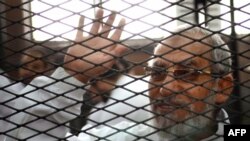An Egyptian court has handed down death sentences to 10 defendants and ordered life imprisonment for 37 others, including three top leaders of the now-outlawed Muslim Brotherhood. Defense lawyers are appealing the court's ruling.
Presiding Judge Hassan Farid read his verdict aloud slowly, amid intermittent heckling by the defendants. The three top Muslim Brotherhood leaders sentenced to life include the group's "supreme guide" and spiritual leader, Mohamed Badie.
Audience members, defense attorneys and many of the defendants themselves tried to shout down the judge at several points before eventually falling silent. The verdict by the court in Cairo's Shoubra district will be appealed to a higher court.
The case involves violence in a province north of Cairo during protests last July against the ouster of Islamist President Mohamed Morsi. Several people were killed and wounded and vehicles were torched in the clashes.
Farid blamed the defendants for the violence and said they had acted out of “terrorist” motives. The Muslim Brotherhood itself was banned earlier this year after the government declared it a terrorist group.
On its Arabic website, Ikhwan Online, the Brotherhood condemned the verdicts, saying, "Ten innocent people were condemned to death.”
Complaint of double standards
Political sociologist Said Sadek noted the verdict came at the same time as a government decision to raise fuel prices, a development that drew public attention away from the case.
Sadek said this was not the first trial conducted in a similar manner. As he told VOA, "Most Egyptians are now used to such verdicts.”
The political analyst contended that Western criticism of such trials is misplaced, especially because many Western states themselves have resorted to strenuous measures when confronted by what they see as domestic terrorism.
"It is just surprising how the West has double standards when it comes to terrorism," Sadek said. When Western countries "get hit by terrorism, they are ready to take action, and even extra-legal action. And when Egypt does the same to save itself from the fate of its neighboring failed states -- like Iraq, Libya, Somalia, Syria -- you have this criticism about the Egyptian judicial system."
A number of Egyptian trials during the past year, including one in which a judge delivered a sweeping verdict ordering the death penalty for hundreds of defendants, have created an uproar in the West. Executions appear to have been delayed indefinitely, however, and it's unclear whether the sentences will actually be carried out.




